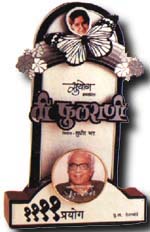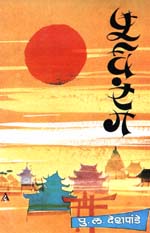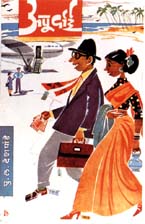 The very name brings a smile to the face of any Marathi reader. P L is equal to fun, joy and happiness for the entire family. A family
gathering rarely ends without a session on P L. And that session is easily the most boisterous. Every member craves to recount one P L joke or a scene from his
plays, one-man shows, films, books or whatever. For decades now, Marathi children have grown with PL's humour. He is verily a member of each household.
The very name brings a smile to the face of any Marathi reader. P L is equal to fun, joy and happiness for the entire family. A family
gathering rarely ends without a session on P L. And that session is easily the most boisterous. Every member craves to recount one P L joke or a scene from his
plays, one-man shows, films, books or whatever. For decades now, Marathi children have grown with PL's humour. He is verily a member of each household.
 Who can forget his book 'Vyakti ani Valli', in which he penned and brought alive several characters, most of them easily identifiable in our households or in
neighbourhoods. Nanda Pradhan, Chitale Master and Antu Barwa. And Narayan and Sakharam Gatne. In Nanda Pradhan, P L invokes our empathy for a character whose
tragedy has the Greek dimension. And P L does it with loving, feeling care. His humour, soft and softer, takes a back seat.
Who can forget his book 'Vyakti ani Valli', in which he penned and brought alive several characters, most of them easily identifiable in our households or in
neighbourhoods. Nanda Pradhan, Chitale Master and Antu Barwa. And Narayan and Sakharam Gatne. In Nanda Pradhan, P L invokes our empathy for a character whose
tragedy has the Greek dimension. And P L does it with loving, feeling care. His humour, soft and softer, takes a back seat.
While Chitale Master endears himself to us by his dedication to work and his sense of humour, Antu Barwa shocks us with his wry humour. "Tell that Gandhi not to speak of fasting to us. We are always fasting here." And characteristically, P L is his own all-good-seeing self as he ends with an Antu Barwa ripened like a jackfruit. Read Narayan and Sakharam Gatne and we can see how P L goes about painting a character a few strokes of humour, a few touches of pathos, interesting incidents and just a passing reference to a philosophical idea or two. The character goes straight to your heart. And stays there.

P L's adoption of George Bernard Shaw's 'Pygmalian' as 'Tee Phulrani' is amazing. No doubt the original, its subject, the plot and the development have in themselves a universal, all-time appeal, as is clear form the worldwide popularity of the drama. But its transformation in Marathi is so complete, so smooth and so apt that the drama seems to have sprouted from the Marathi soil itself. No wonder it continues to run to packed houses in spite of a complete change of cast many a time.His adoption of Bertolt Brecht's " Three-Penny Opera " into a dazzling musical shocks us into at least thinking. P L's ability to retain the piercing edge of the original is astounding, as is his willingness to use different drama techniques to produce the desired effect.

 P L has
another genre of writing up his sleeve. And just as pleasing and popular. His accounts of his travels to all parts of the world. He set the trend in
'Apoorvaee' after his visit to Europe and followed it up in 'Poorvarang' and 'Jave Tyanchya Desha.' As usual, P L is comic at the cost of himself, observes
the different cultures minutely and brings to us the subtle and often funny differences. He is ever ready to see and appreciate beauty in any form as also
the humour created by the contradictions in the human nature everywhere.
P L has
another genre of writing up his sleeve. And just as pleasing and popular. His accounts of his travels to all parts of the world. He set the trend in
'Apoorvaee' after his visit to Europe and followed it up in 'Poorvarang' and 'Jave Tyanchya Desha.' As usual, P L is comic at the cost of himself, observes
the different cultures minutely and brings to us the subtle and often funny differences. He is ever ready to see and appreciate beauty in any form as also
the humour created by the contradictions in the human nature everywhere.






 Return to Main
Return to Main